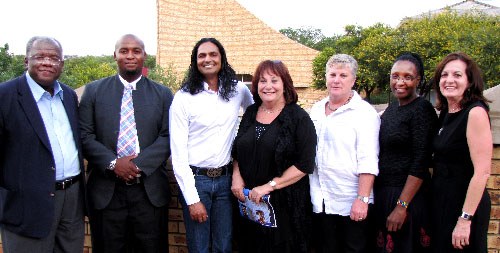 |
Prof. Jonathan Jansen (Vice-Chancellor and Rector, UFS), Butah Makgalemele (FET lecturer), Prof. Dennis Francis (Dean, Faculty of Education), Prof. Daniella Manning-Coetzee (Director: CED), Felicity Skully (EDTP-SETA, sponsors), Thantshi Masitara (SACCI) and Erica Odendaal (VEOP project coordinator) during the launch of the VEOP at the UFS South Campus.
Photo: Christiaan van der Merwe |
The Centre for Educational Development (CED, which will be known as the School for Continuous Education from 2011) of the Faculty of Education at the University of the Free State (UFS) recently launched its special new programme for the furthering of the education of college teachers. The Vocational Education Orientation Programme (VEOP) is geared towards improving the teaching qualifications of Further Education and Training (FET) College lectures.
The programme focuses primarily on college lecturers without professional teaching qualifications, in a sector of the education system that has been long neglected according to Prof. Daniella Manning-Coetzee, Head of the CED.
This is all said to change with the implementation of the VEOP. The CED has already established training centres in Bloemfontein, Qwaqwa, Kroonstad, Thaba N’chu and Sasolburg, serving a total number of 240 lecturers. Topics specifically related to the FET College sector which these lecturers will be schooled in, include teaching methodology, assessment, workplace learning, FET College policy and planning, and action research.
The VEOP was developed by a national task team and reference group representing both universities and FET Colleges, and will be a 30-credit programme counting towards the 120-credit Vocational Education Certificate which is currently under development.